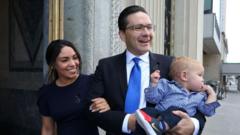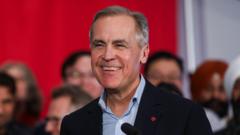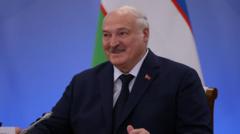An examination of Pierre Poilievre's journey from youth to Conservative leader amidst a potential governmental shift
The Rise of Pierre Poilievre: A Contender for Canada’s PM Position

The Rise of Pierre Poilievre: A Contender for Canada’s PM Position
Pierre Poilievre's path to leadership could reshape Canada’s political landscape
Pierre Poilievre, a Conservative stalwart and current leader of Canada’s Conservative Party, seems poised to make his mark on Canadian politics. A 45-year-old native of Calgary, Poilievre has garnered attention for his conservative views, advocating for a low-tax, small government approach. As articulated in an early essay at just 20 years old, he proclaimed, "A dollar left in the hands of consumers and investors is more productive than a dollar spent by a politician.” His recent remarks in an interview with Jordan Peterson highlighted the continuity of his vision for Canada.
With recent surveys showing the Conservatives leading significantly over the beleaguered Liberals, Poilievre is well-positioned for potential electoral success, especially following Prime Minister Justin Trudeau's announcement of stepping down. This political landscape shift may usher in what Poilievre describes as a return to “common sense politics,” a direct critique of what he perceives as Trudeau’s “authoritarian socialism.” If successful, his leadership could align with broader populist trends that have seen similar leaders gain traction in the West.
Born in Alberta to a young mother who placed him for adoption, Poilievre's life took a decisive turn when he was raised by two educators in suburban Calgary. His early political engagement began in his teens when he actively campaigned for local conservatives. He rose rapidly through the political ranks, joining Canadian politics at 25, making him one of the youngest Conservative MPs in history.
Poilievre's journey is marked by his combative nature in Ottawa, notably earning him the nickname "Skippy." Despite a reputation for fiery debate and pointed attacks on Trudeau, he has also demonstrated an ability to engage diplomatically behind closed doors. Nonetheless, his confrontational style and straightforward communication has generated mixed reactions; while appealing to a portion of the electorate, he remains a polarizing figure, as shown by unfavorable views held by over half of Canadians.
Striking a balance between populism and mainstream conservatism, Poilievre's positions often focus on everyday Canadian lives and critiques of elite establishments. He voiced support for demonstrators protesting vaccine mandates in the 2021 "Freedom Convoy" incidents and pledged an unprecedented crackdown on crime. His views on social issues often reflect reluctance to engage, sticking to mainstream conservative stances on matters like same-sex marriage and abortion.
In recent months, Poilievre’s party has advocated for a more calculated approach to immigration, intending to connect the flow of newcomers to housing developments. His own family story, with his wife Anaida arriving in Canada as a child refugee, informs his perspective on integration and community.
As the political climate shifts with potential tariffs under an incoming Trump administration, Poilievre insists on Canada's sovereignty, stating he aims to "put Canada first." His foreign policy engagement remains limited, focusing instead on revitalizing the "Canadian dream" while distancing his vision from what he describes as “grandiosity” associated with the current regime.
Given the impending changes in leadership, Poilievre’s ascension could mark a significant transition in Canada’s political narrative, as he continues to champion a platform rooted in conservative principles and a pragmatic vision.
With recent surveys showing the Conservatives leading significantly over the beleaguered Liberals, Poilievre is well-positioned for potential electoral success, especially following Prime Minister Justin Trudeau's announcement of stepping down. This political landscape shift may usher in what Poilievre describes as a return to “common sense politics,” a direct critique of what he perceives as Trudeau’s “authoritarian socialism.” If successful, his leadership could align with broader populist trends that have seen similar leaders gain traction in the West.
Born in Alberta to a young mother who placed him for adoption, Poilievre's life took a decisive turn when he was raised by two educators in suburban Calgary. His early political engagement began in his teens when he actively campaigned for local conservatives. He rose rapidly through the political ranks, joining Canadian politics at 25, making him one of the youngest Conservative MPs in history.
Poilievre's journey is marked by his combative nature in Ottawa, notably earning him the nickname "Skippy." Despite a reputation for fiery debate and pointed attacks on Trudeau, he has also demonstrated an ability to engage diplomatically behind closed doors. Nonetheless, his confrontational style and straightforward communication has generated mixed reactions; while appealing to a portion of the electorate, he remains a polarizing figure, as shown by unfavorable views held by over half of Canadians.
Striking a balance between populism and mainstream conservatism, Poilievre's positions often focus on everyday Canadian lives and critiques of elite establishments. He voiced support for demonstrators protesting vaccine mandates in the 2021 "Freedom Convoy" incidents and pledged an unprecedented crackdown on crime. His views on social issues often reflect reluctance to engage, sticking to mainstream conservative stances on matters like same-sex marriage and abortion.
In recent months, Poilievre’s party has advocated for a more calculated approach to immigration, intending to connect the flow of newcomers to housing developments. His own family story, with his wife Anaida arriving in Canada as a child refugee, informs his perspective on integration and community.
As the political climate shifts with potential tariffs under an incoming Trump administration, Poilievre insists on Canada's sovereignty, stating he aims to "put Canada first." His foreign policy engagement remains limited, focusing instead on revitalizing the "Canadian dream" while distancing his vision from what he describes as “grandiosity” associated with the current regime.
Given the impending changes in leadership, Poilievre’s ascension could mark a significant transition in Canada’s political narrative, as he continues to champion a platform rooted in conservative principles and a pragmatic vision.























